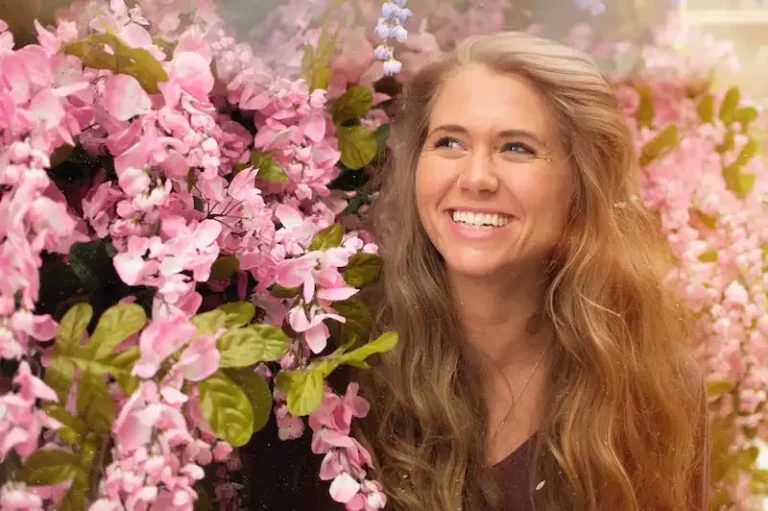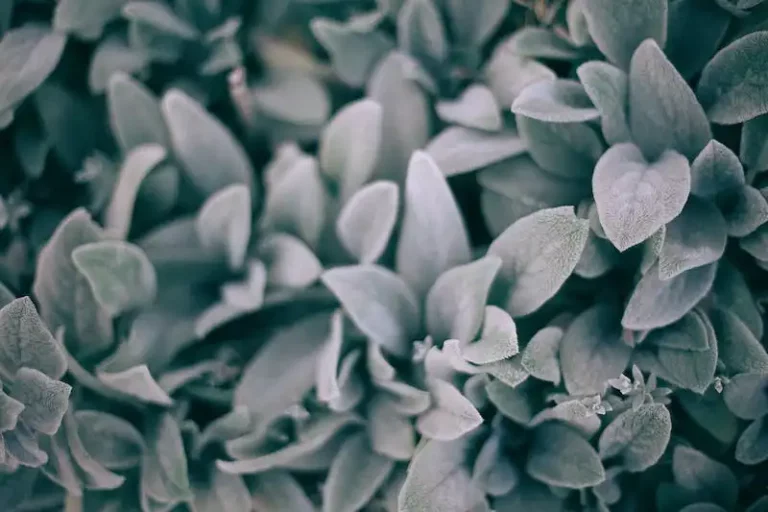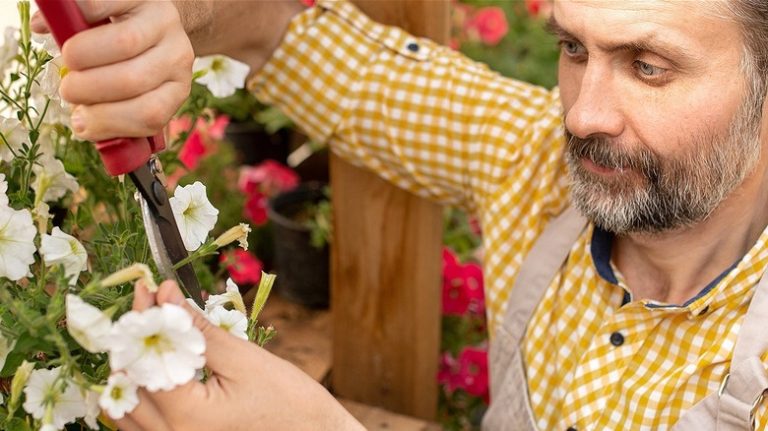If the entrance to your home is lacking in charm and hospitality, it’s probably time to hit up the garden center in search of the right decorations. Hanging baskets are an absolutely wonderful way to brighten porches and patios while also welcoming pollinators to your yard. Many colorful flowers attract everything from bees and butterflies to hummingbirds with their delightful scents and sweet nectar. And, there is nothing quite like a floral display that uses every color of the rainbow. As explained by 1-800-Flowers, each flower color has its own meaning and symbolism. Blues invite serenity. Pinks, gentility, and grace. Still, yellows and oranges beckon energy, joy, and aliveness.
The best news of all is that there’s no reason to settle for one hue or corresponding mood. Many plants produce wonderfully multicolored blooms or have been cultivated into hybrids that offer different solid-colored flowers within the same bunch. Here you’ll find some reliable standards as well as some unique showstoppers you may have never considered before. Mix and match to your heart’s content and watch as the butterflies arrive. You’ll probably get a few friendly waves from the neighbors passing by as well.
1. Trailing fuchsias
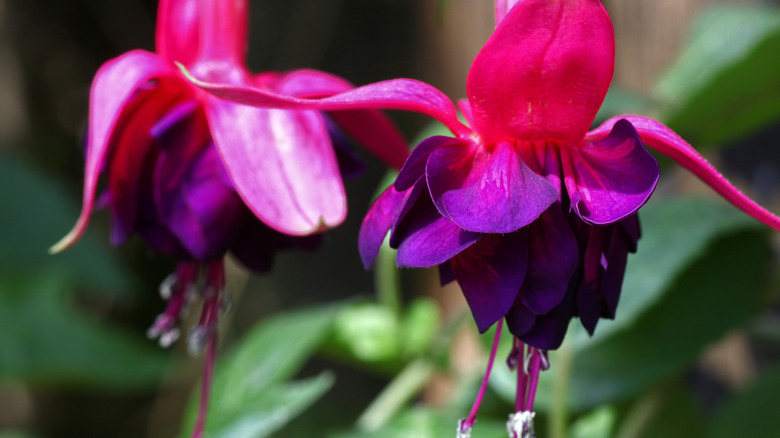
Let’s hit the ground running with a unique plant. The bell-shaped blooms of Fuchsia Dark Eyes combine purple and red to create something that looks like it should be swimming in the ocean. These eye-catching flowers will grow on long stems that spill over the sides of your hanging basket as if they are weeping.
Bloom Season: Summer and fall
USDA Hardiness Zones: 8 to 11
Growing Conditions: This plant requires both sun and shade throughout the day
Soil Type: Chalk, clay, loam, or sand
Size: 1 to 2 feet tall and wide
2. Blue bird hibiscus
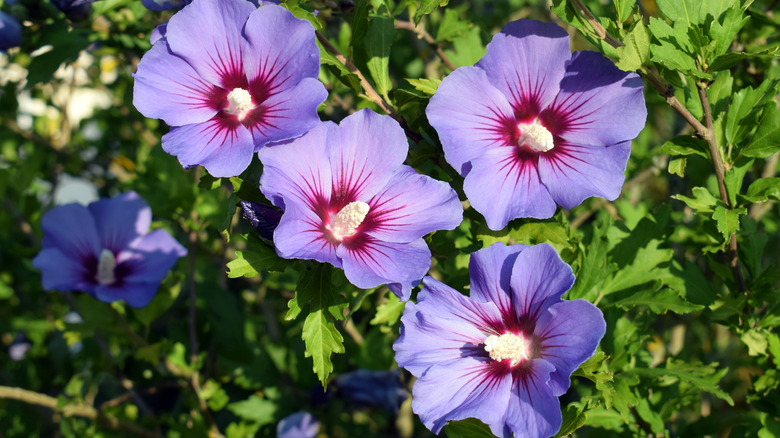
Hibiscus may not be the first flower you consider for container growing, but Mother Nature confirms it can be done, and a small pot, like a hanging basket, works best. The blue bird variety (hibiscus syriacus blue bird) stuns with large blue-violet blooms that have a deep magenta-colored spiking pattern flowing out from their centers.
Bloom Season: Summer
USDA Hardiness Zones: 5 to 9
Growing Conditions: Full sun to partial sun with regular watering
Soil Type: Well-draining with fertilizer for flowering plants
Size: Can grow large but will stay small when slightly root bound
3. Florist’s cineraria
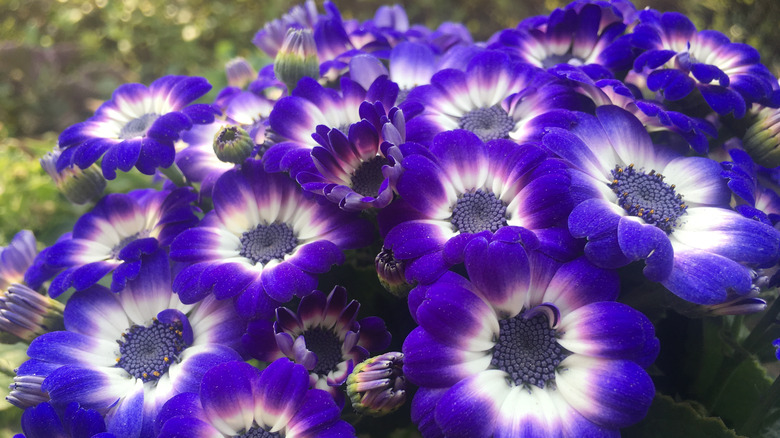
Riya Dhama/Shutterstock
Check out these neon purple blooms that hail from the Canary Islands. Pericallis x hybrida is commonly called florist’s cineraria or simply cineraria. It’s the contrast between the colors on each flower that make this one really stand out.
Bloom Season: Winter and spring
USDA Hardiness Zones: 9 to 11
Growing Conditions: Part shade
Soil Type: Moist, fertile with high levels of organic matter, well-draining
Size: 12 to 18 inches tall, 12 to 24 inches wide
4. Passion flowers
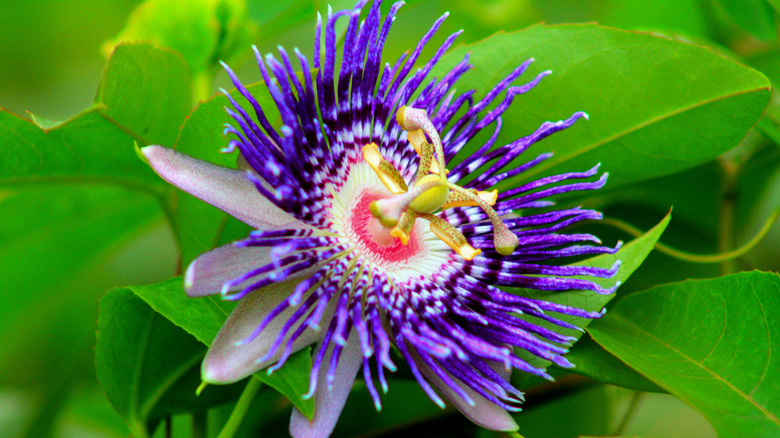
Amarfotografia/Shutterstock
Funky, unique, and bursting with vivid colors, the passion flower (passiflora incarnata) is the ultimate showstopper. Just imagine your neighbors out for a walk around the block. Could anyone keep from commenting on something so bizarrely beautiful? Gardenia explains that the long stems that hang down from your basket will be the ones most likely to bloom profusely.
Bloom Season: Spring, summer, and fall
USDA Hardiness Zones: 8 to 11
Growing Conditions: Full sun to partial sun
Soil Type: Well-draining, water heavily, refrain from fertilizing
Size: 2 to 3 feet long in containers
5. Treasure flowers
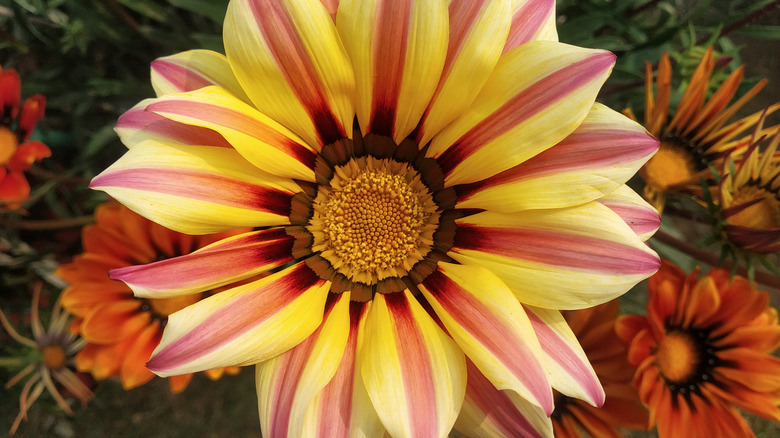
Supertramp86/Shutterstock
That is a treasure indeed! Gazania big kiss white flame, the treasure flower, is definitely one that deserves its nickname. It’s like a sunflower wearing a striped clown costume. This heat- and drought-tolerant oddball loves to bask in the sun all day and then blossom at night or when it’s cloudy. Use it as the centerpiece to a basket bursting with color.
Bloom Season: Spring and summer
USDA Hardiness Zones: 8 to 10
Growing Conditions: Full sun
Soil Type: Loamy or sandy
Size: 8 to 10 inches tall and wide with 5-inch blooms
6. Bi-color freesia
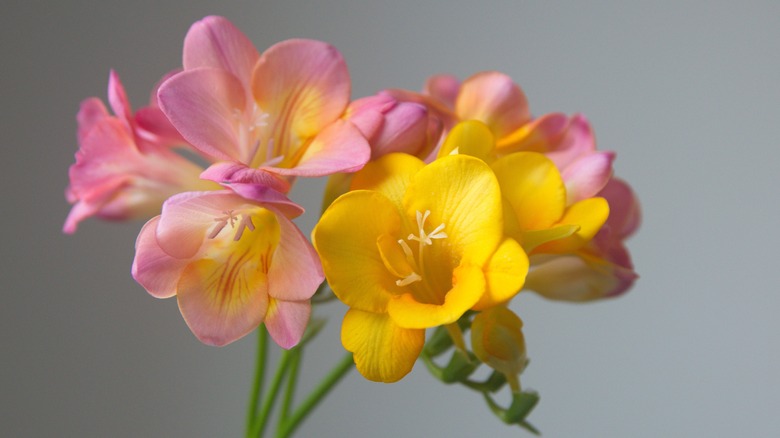
aniana/Shutterstock
Are you ready for some fragrance? Single bi-color freesia emits an irresistible fruity scent reminiscent of strawberries. Each 2-inch blossom will add pink, yellow, and orange to your arrangement, and their stamens are sometimes light purple. Freesia are big-time favorites with pollinating bees. The word single in their name refers to the basic shape of their single row of petals surrounding the stamen.
Bloom Season: Spring
USDA Hardiness Zones: 8 and up
Growing Conditions: Full sun
Soil Type: Well-draining, sandy or rocky
Size: Up to 18 inches tall
7. Petunias
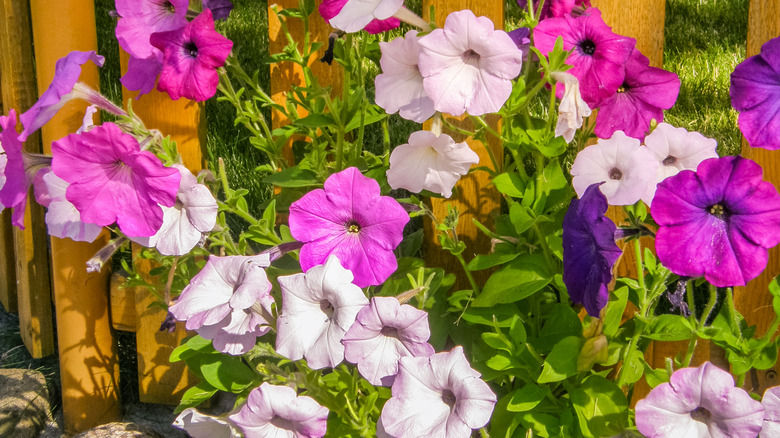
LifeCollectionPhotography/Shutterstock
Easy-to-grow, easy-to-care-for petunias (Petunia Hybrida Mix) are considered a reliable staple in the hanging basket game for good reason. Many nurseries and garden centers offer multicolor options that will flush your hanging basket with color from a single plant that blooms from spring all the way through to the fall.
Bloom Season: Spring, summer, fall
USDA Hardiness Zones: 3 to 8
Growing Conditions: Full sun to partial shade
Soil Type: Well-draining, slightly acidic potting mix
Size: Up to 16 inches tall
8. Wind flowers
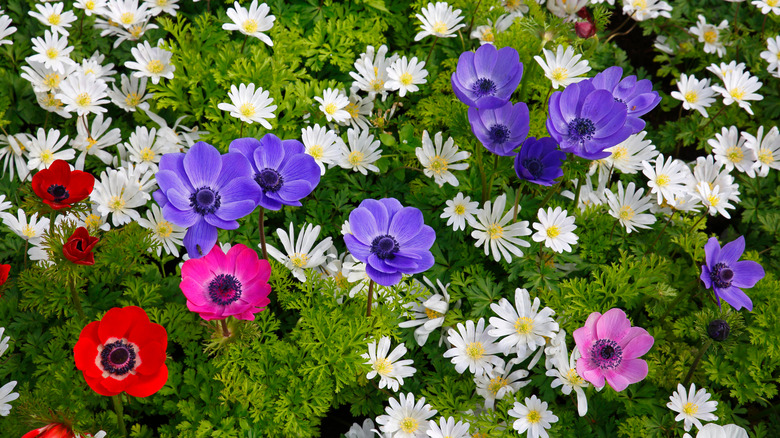
imageBROKER.com/Shutterstock
Yes, sea anemones are predatory marine animals, but what about their namesake anemone wildflowers? From the buttercup family of ranunculaceae, these symbols of love and fragility emerge from the soil just like poppies and are equally cute. Per Southern Living, look for tuberous anemone (anemone tuberosa) when filling containers and know in advance that they have the potential to become invasive.
Bloom Season: Spring, summer, and fall
USDA Hardiness Zones: 3 to 8
Growing Conditions: Partial shade, regular watering
Soil Type: Well-draining loam
Size: Various, from 6 inches tall up to 2 feet
9. Popcorn lantanas
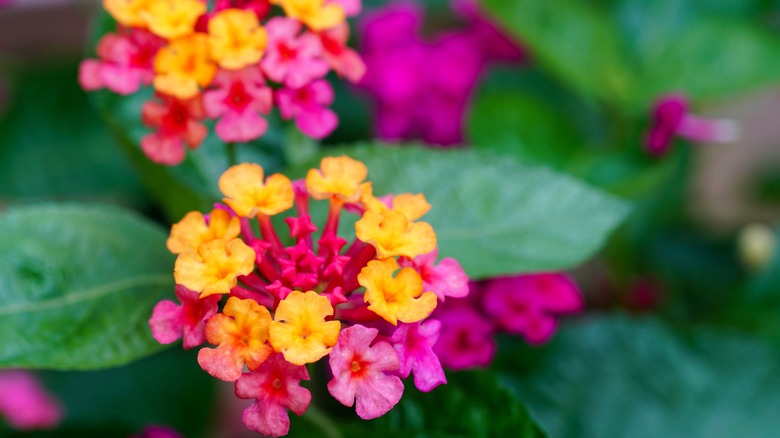
Oasishifi/Shutterstock
Lantanas are a commonly known flower often used in landscaping, and we’re dedicating this slot to the multicolored popcorn variety specifically. According to Gardening Know How, popcorn lantana (lantana trifolia) comes in two cultivars called fruity pebbles (pictured above) and lavender popcorn. Lantanas are known to self-sow; if you don’t want them to keep spreading deadhead remove spent blooms before they go to seed.
Bloom Season: Summer and fall
USDA Hardiness Zones: 8 to 11
Growing Conditions: Full sun
Soil Type: Fertile, well-draining
Size: 6 to 12 inches tall
10. Strawflowers
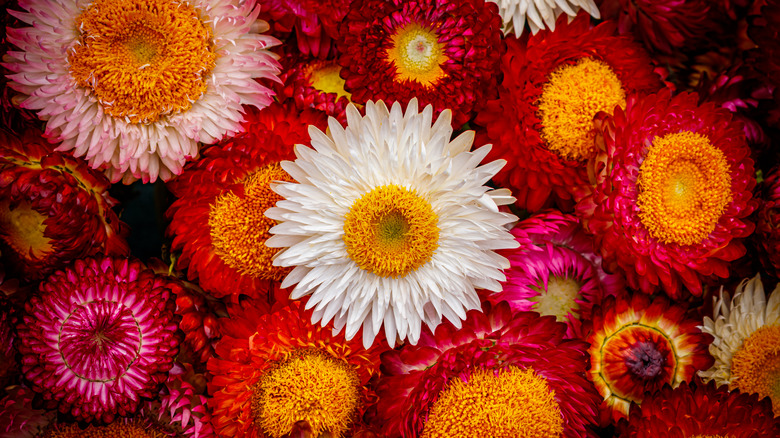
nnattalli/Shutterstock
Strawflowers (xerochrysum bracteatum), sometimes called everlasting daisies, can be known to grow up to 3 feet tall. But there are dwarf varieties, like the bright bikini, that will top out at around 12 inches and add stunning reds and oranges to a hanging basket. It’s a low-maintenance plant, although it does require deadheading and can be prone to downy mildew.
Bloom Season: Summer and fall
USDA Hardiness Zones: 8 to 10
Growing Conditions: Full sun to partial shade
Soil Type: Loamy
Size: Up to 15 inches tall

